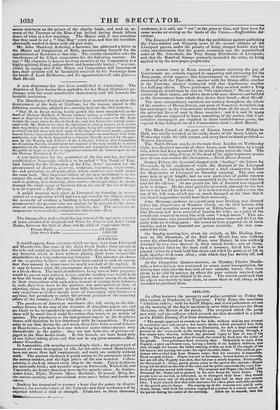The Stamp-office makes the following return of the aggregate amount
of notes circulated in England and Wales by Private and Joint Stock Drunks, between the 2.5th of June and the 24th of September ISS6.
Private Banks X7,764,H24
Joint Stuck Batiks :i,969,1 21
LI l,73,94
It would appear, from accounts which we have seen from Liverpool and Manchester, that sonic of the Joint Stock Banks there are not in the safe and sound position that should enable them to bear up against any financial crisis, at least without placing their more responsible shareholders in a very embarrassing situation. The advances on shares of the respective banks is said to have been carried to such an extent, that they amount in many cases to nearly one-half of the capital. It is easy to foresee what the consequence must be should matters conic to a break-down. The small shareholders, being men of little property, would be passed over without notice, and the wealthy ones would have to bear the brunt of the whole. Money is so scarce" among tin in, that in their transactions with each other, instead of settling their balances in cash, they have been in the practice, not unfrequently of lute, of adjusting them, by payments in short bills, deducting the discount; a very suspicious as well as unsafe mode of transacting such business at any time. but peculiarly so under the present position of the monetary affairs of the country.— Times City Article.
The purchases of American merchants this fall, owing to the diffi- culties thrown in the way of the discount of American paper, are, and are likely to be, comparatively speaking, tory small ; amid consequently there will be much less &mond for cotton than usual, as an article of returns. The purchasers of the independent buyers in the Southern States will therefore be less interfered with by competition. We are sorry to say that, during the past week, there have been several failures in Manchester,—in more than one instance under circumstances very discreditable to the parties : they are not, however, of persons en- gaged in the Manchester trade. In this branch, we have heard only of one failure taking place, and that not to any great amount. —Man- chester Guardian.
In Lancashire, silk-weaving is exceedingly slack ; the greater part of weavers of every description of silk, for ten miles round Manchester, have not more than half employment, and many are entirely without work. The present slackness is partly owing to the precarious state of die money-market, and the high prices of the raw material. Calico. printing is slack at almost every shop in the trade. Fancy nankeens are unusually brisk ; and weavers' wages in Prestwich, Whitefield, and Unsworth, are better than they were twelve months since. At Ashton- under-Line, Hyde, Newton Moor, Rochdale, Heywood, Bury, &c. the cotton. spinning and power-loom were never better, and hands are scarce.
Nothing has transpired to warrant a hope that the points in dispute between the manufacturers of the l'otteries and their workmen will be adjusted without a trial of strength. From two to three thousand
workmen, it is said, are " out " at the present time, and have been for some weeks sill sisting on the funds of the Union.—Staffirdshire Ad- vertiser.
The Liverpool Chronicle states that the prohibition against publishing the Corn-market and Shipping news in the second editions of the Liverpool papers, under the penalty of being charged double duty for every advertisement that the papers contained, was the unauthorized order of Mr. Staniforth, the Tory Stamp Distributor of Liverpool; and that the Board of Stamps promptly rescinded the order, on being applied to by the newspaper proprietors.


























 Previous page
Previous page